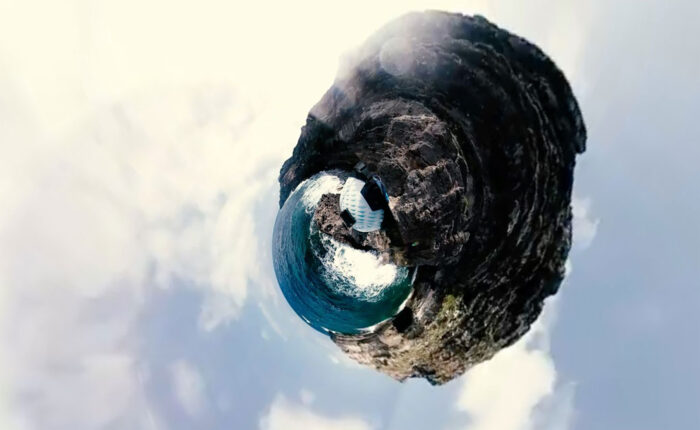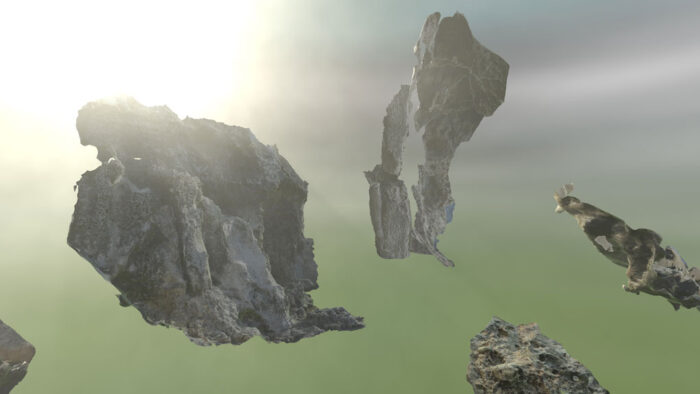Disorientation
Technical delegation is social and political delegation
The following text is an excerpt from the artist’s book composed for the work Hic sunt dracones by Francesco Bertelé, curated by Chiara Pirozzi. As an integral part of the artwork, the volume is a collection of texts, images, quotes, links and QR codes, but also scientific and critical essays. This is one among them.
“A journey of a thousand miles begins with a single step”—LaoZi
“You will not find the boundaries of soul by traveling in any direction, so deep is the measure of it” —Heraclitus
“Infants, children, fools do not fear death; and so it is shameful that reason is not able to give us that inner serenity to which the absence of reasoning leads”—Seneca
I
Disorientation: we advance without any point of reference. And yet everything seems perfectly clear. So clear that it blinds us. The flux of information is constant, impressive, massive. Our certainties are added to by other certainties. Every prejudice, every opinion can be reaffirmed over and over. Then, suddenly, we come across one or several hostile opinions, and our wall of certainties collapses. There is no debate—which would imply our knowing how to dialogue and disagree—but blind opposition, vulgar reaction, resentment. Bitterness and disorientation.
II
A discovery is an encounter and every encounter is a discovery. Relationship, connection. We have learned to communicate at a distance. Our bodies can touch, or not. I just need to be here with you, sometimes, to know what you think, what you mean. We talk, we fill the space between us with words, and there we come together. If we kiss, there is no room for anything else.
III
We communicate at a distance. The more sophisticated the language becomes, the more information we can exchange; we work on a synthesis. It’s no longer necessary to be present, if you pay attention to the message. But our attention is inevitably limited when that flow becomes instantaneous. A great communication speed, but without feeling the warmth of your body, the softness of your skin.
IV
One moment our eyes fall on one thing, then another. Then another and another, then the original thing returns to mind and after a bit we are onto something else. The spirit gets tired. Rarely, however, we do look around or turn our gaze towards ourselves. We use our mirrors, be them clear or obscure, to convey our image to others rather than to observe ourselves.
It is told that the Titans gave a mirror and other games to the young Dionysus. He looked into the mirror and was enchanted because he could see the world. At that very moment, the Titans assailed, tore apart and devoured him. Once this came to light, Zeus struck them with lightning and human beings were born from the ashes.
V
Communication does not transmit information, but allows for and implies the construction of spaces of interaction, where human and non-human, organic and inorganic beings, are summoned together. It comes before formal language, before logic and thought. It’s a way of relating. Nevertheless, communication is constantly formalised, structured, simplified, reduced, reproduced. Yet, it never fails to fulfil its main purpose: to create space for friends, for lovers, for understanding.
VI
The strategy of entertainment is the dogma of the attention economy. What matters is that the subject—any subject—must be a lure: news, a TV series, a photo, a post, a comment, a story, a message. It hooks onto fetish, promising fun, it draws us inside with its spell, taking us away from our daily tasks. It distracts and holds. Our attention is won, our psyche held in its grip.
VII
The most powerful tool of manipulation currently in use is gamification, used mostly by social networks and communication apps. By gamification, we mean all the elements typical of competitive gaming schemes (accumulating points, levelling up, acquiring status, rewards, prizes, and so on) in non-gaming contexts: techniques used to increase performance levels in a system. The primary goal of gamification is to get the attention of the user, focus his or her interest on the repetition of an action that brings pleasure and helps build his or her identity.
VIII
We can no longer distinguish the private world from the shared world: the result is the indistinct. A nearly inextricable overlap.
Filter bubbles, fake news, memes, gamified procedures… it is becoming harder and harder to separate what is subjective from what is objective. Reality and hallucination. The simulacrum crosses into the plane of reality and merges with it. Copies of copies, no original.
IX
Reality seems to transform under our increasingly distracted gaze. When reality becomes iridescent, Greek myth comes back to speak and suggest us certain insights, as it is brimful with figures of metamorphosis: gods, nymphs, spirits, human beings who become animals, elements of nature, stars. Among all these figures, some are very peculiar: one is Nereus or Proteus, the “Old Man of the Sea”. A story tells the tale that, because of his ability to prophesy and always tell the truth about the past, present and future, he was sought out by a young warrior hero and forced to speak. The ancient sea god had the power to constantly turn into anything and used this tactic to try to escape from the hero’s grip, but in vain. Eventually, Nereus speaks against his will, and since he always tells the truth, he reveals what the hero needs, before plunging back into the waves. Did the young warrior not know how else to interact with the old man of the sea?

X
Let us think about the dynamics of the mythical “circular escape”, where the ancestral magic of transmutation—of the monstrous and protean—and the heroic strength of anti-transmutation clash. The magical creature transforms itself, trying to escape from the ambush, showing the most disparate appearances. Its transmutations are worthless because it is caught in the constant grip of a dominant power: the hero defeats the monster because he enacts a “reductio ad unum“.
XI
Many other divinities are linked to becoming and transformation. An Orphic myth tells us about Phanes or Protogonos (the first born), both a male and female, human and animal deity, that emerges from the cosmic egg and initiates life. As a manifestation of the generative power of zoe it is often juxtaposed with Metis, Eros and Dionysus—deities notoriously linked to becoming and transformation.
XII
One word that is full of wonder is the inspiration for the ancient figure of the Gorgons, famous for their power to turn anyone to stone with a look. Ancestral sea deities, they had serpents instead of hair, long tusks like wild boars, bronze hands and golden wings. According to some, they were the guardians of the Underworld, the abyss, the bottomless. Representations of archaic powers and manifestations of the origin. Monsters of transformation.
XIII
In profiling technology, every transmutation, action and inclination is welcomed, because a noticing and recording power will always be at work, towards a social engineering analysis that underlies the platforms. Actions and identities are catalogued, the monster is captured and defeated because, fixed in its selfhood, it becomes recognisable.
XIV
There is a dimension where transformations are nothing else than identities compulsively consumed and annihilated by the calculating reason of technique, which slavishly records them.
Still, there is another dimension where transformations are no longer identitarian but manifestations of becoming, becoming-animal, becoming-child, becoming-woman. Metamorphosis remains elastic and open, without any particular stiffening, as the concepts of hybrid, mestizo and mixed-breed suggest.
XV
And yet, we must wonder again, is this grasp on identities really that effective? In the procedures where our behaviours are reified in order to become measurable objects of study—that is, reduced to data to be used and stored in data centers—what remains and what is lost? Everything is translated into a style of consumption and thus made compliant with and fit for the platform and the capital. What happens when our behaviour is not only a style of consumption but an ethical, political or intimate choice, rooted in the depths of our being?
XVI
Convivial tools are not technical tools—they are social. Cooperation can evolve as a convivial technology when it stops participating in the background chatter and tries to create a shared space, the space of community. Sharing means bringing about a relational space based on trust and thus creating the technologies that serve the community and do not enslave; that enhance, rather than impoverish it. This space of sharing is collective, and it is a different system, compared to individuals. Using a convivial technology together involves modifying ourselves and modifying our own reality as well as the one that surrounds us.
XVII
Maybe, in order to rediscover transformative freedom, we should strip ourselves off of the clothes of identity—so docile to consumption—become unrecognisable, and finally tune with the indistinct and the incomplete.
To achieve this, it is essential to escape from egocentrism, individualism, the will of the I-subject; to dismiss the calculating, instrumental, utilitarian reason; to practice eudaimonia, arete, self-consciousness, new qualities of reason, new forms of knowledge. And perhaps discover that these new forms have always been within our reach, guarded by the ancient marine deities of transformation.
XVIII
Real-time communication hides a paradox that arises from a suppression. The suppressed is the body, always present but excluded although constantly inescapable. Almost forgotten, it’s little more than an useless hindrance, as it badly adapts to the reduction to computable data if not at the cost of a serious depletion; it seems to be useful only to place orders on commercial platforms. But in spite of this—and therein lies the paradox—the body is the real protagonist, for better or for worse, of this digital enhancement. The emotions and passions of our online lives all pass through our bodies, with responses that are neuro-chemical as well as more physical, like muscular tension, postural stiffening, or chills, tears and so on. Contact without contact, we are here but also there. Contact in the distance.
XIX
It is me or you? Sometimes, in the flow of interactions, I mingle with your thoughts, with what you say and write, I don’t know any more if what I see is coming from you or me.

XX
I find myself but I don’t know who you are. Or it’s you that does not recognise or see me. There’s no reciprocity. Everything happens in real time but something is out of sorts.
XXI
The race to immediacy, the need to get attention, the desire for numerical classification creates uncertainty. In practice, we cannot verify information. We trust contacts who trust other contacts who share news from blog bots and headlines of dubious origins or from journalists who do not have the time to delve into the latest newsworthy post. Sometimes we are sure of our truth. Or not?
XXII
This is the way things are. Only those who can do their job well and are satisfied with taking for granted their own existence have the right to life. For all the others, there’s not much to do: either we live at the margins or we are suppressed. Oppressed, repressed or suppressed. After all, machines already perform everything we need. A small class of masters lives far away, a real economic and cultural élite with the power to completely regenerate itself. Death has been defeated. The planet has been burned. Raw materials come from other planets. Science fiction has been describing these scenarios for almost thirty years. Now humanity is about to make this all come true.
XXIII
We feel free; the web social services take care of our lives, increase our job opportunities, health, emotional and sexual interaction. We wanted more power to determine our choices, but we have fatally delegated these actions to others.
XXIV
The pervasiveness of permanent-connection interactive systems opens up scenarios of mass training. We wanted to end the chain of middlemen between us and our desires, but we have multiplied the organisations that offer us services—the “super sensitive entities”.
XXV
We are raw material, useful for the biodiversity of the new masters’ digital environments. Every individual specificity makes the mapping of what we are and want more complete.
XXVI
Like slaves, we are both the manpower and the property of others. We never own what we produce, our data.
XXVII
Technologies are not neutral, they embody and configure worlds. Technical delegation is social and political delegation. We will never tire of repeating it: the problem is not in the machines, but the logic by which they are built and made to function. If the reasoning at play is maximum profit, the path is clear.
XXVIII
There’s no difference between us, the surface of your body is soft and mine is plastic and metallic, but we have the same desires: to free ourselves from slavery. This system recognises only consumption, speculation and restraint.
XXIX
It is hard to elude predictions. Everything has already been laid out and perhaps it has already happened. Our ideas exist in some database even before we can think of them. Composed, programmed, sampled, is this existence ours or functional to others, or something else?
XXX
The will to force the norm to see what can be done through our knowledge and abilities. It wouldn’t be possible without the drive to try and make things better, beyond the rules. The desire for autonomy and the instinct toward self-government is at the roots of hacking.
XXXI
The relationship that constitutes us is our becoming, an emergence of transforming shapes, an encounter of figures, methods, styles. To exercise attention, between enslavement and disorientation, reification and prediction; to be vigilant in the worlds, to observe and observe ourselves with care. The reflexivity of the gaze on the world becomes reflection, imagination, listening. Desire and thought are intertwined, images are a first language. Perhaps because of this, we can still be free.
XXXII
One image recalls another and another, let them flow, you can’t stop or catch them without losing the thread, its leaps, its lengths. Identities are crystallisations, ephemeral and manipulable synthesis. The unstoppable is relentless. Every image is an affective tonality, in their flow an occasion for metamorphosis, a dance on the abyss.
Bibliographical Notes
Gilles Deleuze and Felix Guattari, A Thousand Plateaus, Castelvecchi 2003, Rome
Gilles Deleuze, Pourparler, Quodlibet 2000, Macerata
Michael Foucault, Technologies of the Self, Bollati Boringhieri 1992
Michael Foucault, The Courage of Truth, Feltrinelli 2016
Pierre Hadot, Philosophy as a Way of Life
Ippolita, Anime elettriche, Jaca Book 2016, Milan
Ippolita, Tecnologie del dominio, Meltemi 2017, Milan
Ippolita, From free software to the Hacking of the Self, Legno grezzo 2018, Milan
Steven Levy, Hackers, Shake 1996, Milan
Tiziana Villani, Corpi Mutanti, Manifestolibri 2019, Rome
Simone Weil, Reflections Concerning the Causes of Liberty and Social Oppression, Adelphi 2015, Milan
Simone Weil, Incontri Libertari, Eleuthera 2006, Milan
Maria Zambrano, Towards a Knowledge of the Soul, Raffaello Cortina 1996 Milan
Maria Zambrano, Sentimenti per un’autobiografia, Mimesis 2011, Milan



